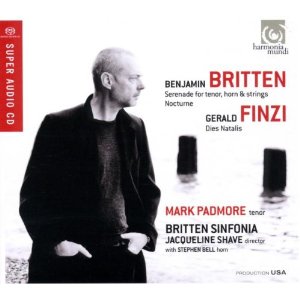Tenor Mark Padmore is a world-class singer who has made some very fine recordings, earning our highest praise (and rating) for his 2009 recording of Britten’s The Holy Sonnets of John Donne and Winter Words (read review here); he has received equal accolades for his CDs of Schubert song cycles. Although there’s plenty of that same vocal beauty and technical mastery on display here, odd mannerisms and a sometimes fussy, punctilious expressive style call the wrong kind of attention to the singing, which left me, a fan of this music and of this singer, disappointed. After a Prologue in which hornist Stephen Bell plays the notes but without, say, Barry Tuckwell’s extraordinary nuance and control of tone and dynamics, Padmore delivers a Pastoral that’s tonally lovely but expressively undistinguished and at odds with the music.
Britten’s tenuto markings on each note should ensure an even, unaccented connectedness that lends impetus to the long line and creates a certain tension as each phrase builds in a rising arc, then descends along with “the Chariot down the hill.” Instead, Padmore disrupts both the poetic imagery and musical effect of that long line by choosing to individually emphasize each word, a mannerism that stifles the linear flow and becomes almost absurd on the phrase “Appears a monstrous elephant.”
Further, and unlike in any of his previous recorded performances, the tenor here shows a disturbing and distracting tendency to prolong vowels and wallow in a wide vibrato as if for some kind of expressive effect, most pronounced in the Nocturne (“The long light shakes across the lakes…”). The Dirge provokes only an “eek!” rather than the terrifying “Yikes!” we experience from Pears and Tuckwell (the horn is the culprit); and where most tenors’ runs in the sixth movement (Hymn) are never less than slightly squishy, Padmore’s sound as if he decided to just slide through and forget even an approximation of detail.
In the much knottier Op. 60 Nocturne the above-mentioned vocal mannerisms and interpretive oddities are less prevalent–or at least are not so noticeable as there is much more going on orchestrally. You will jump out of your seat at the immediacy and realistic presence of some of the instrumental accompaniments–the string pizzicatos and bassoon in “Below the thunders of the upper deep”; the timpani in “But that night when on my bed I lay” (impressive, but way too much).
Finzi’s song cycle Dies Natalis–lyrical, traditionally tuneful, rooted in late-19th-century romanticism–was both a sensible and intriguing programming idea. Here is a work by a composer contemporary with Britten but whose stylistic sensibility is so different. And yet, if you really listen to his treatment of text and associated melody, there is a definite similarity, in the rhythmic freedom and melodic range and contour. Padmore thrives in this music, and here we have him at his best, vocally and expressively.
This is a strange journey in which you’re tossed and turned and left not quite sure where you’ve been left off. Most listeners will be interested in this recording for the presence of Mark Padmore and hearing him in the Serenade–and, my reservations aside, it’s certainly not a bad rendition. But I have to say, when I hear Pears and Britten perform these songs, there’s a communicative aspect that goes right to the heart, the gut, the soul. Whether you’re a fan of Pears’ voice or not, he tells the story of Britten’s songs like no one else, and if you’re a fan of Britten’s music you can’t do without those extraordinary recordings. Padmore is a great singer, but, at least in the Serenade, this is not his best work.
































